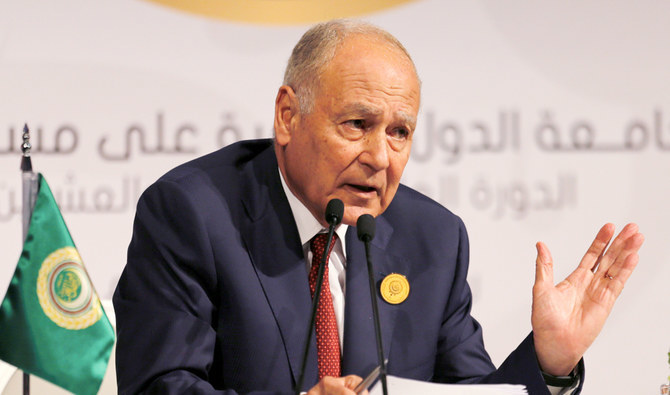
by arabnews — CAIRO: The Arab League on Saturday said Lebanese officials should have dealt differently with the crisis stemming from comments by the country’s information minister which have impacted its relations with countries in the Gulf region. Arab League Secretary-General Ahmed Aboul Gheit “expressed his deep concern and regret over the rapid deterioration in Lebanese-Gulf relations…,” the league statement said. He also said that there are parties that have an interest in dismantling Lebanon’s relations with Arab countries. The statement added Aboul Gheit was confident Lebanese President Michel Aoun and Prime Minister Najib Mikati would act quickly to ease the crisis.
Aboul Gheit appealed to Gulf countries “to reflect on the measures proposed to be taken…in order to avoid further negative effects on the collapsing Lebanese economy”. The statement came a day after Saudi Arabia ordered the Lebanese ambassador to leave the Kingdom within 48 hours and banned all Lebanese imports in response to remarks by the Lebanese minister, who described the war in Yemen as Saudi “aggression.” Hours later, Bahrain ordered the Lebanese ambassador to leave the country within two days for the same reason, Bahrain’s foreign ministry said. (With Reuters)
Four Gulf states including UAE pull diplomats from Beirut
By AFP — The diplomatic row, which has also seen Riyadh suspend imports from Lebanon and both Kuwait and Bahrain expel Lebanese envoys, is another blow to a country already in the grip of crippling political and economic crises. Lebanon had been counting on financial assistance from the Gulf to rescue its economy. “The UAE announced the withdrawal of its diplomats from Lebanon in solidarity with the sisterly Kingdom of Saudi Arabia in light of the unacceptable approach of some Lebanese officials towards Saudi Arabia,” the foreign ministry said in a statement. It “also decided to prevent its citizens from travelling to Lebanon,” it added. It came a day after the Saudi and Bahraini moves and hours after Kuwait asked Lebanon’s envoy to “leave in 48 hours” and recalled its ambassador from Beirut.
The dispute was sparked by the broadcast this week of an interview in which Lebanon’s Information Minister George Kordahi criticised the Saudi-led military intervention in Yemen. In his remarks — recorded in August but aired on Monday — Kordahi called the seven-year war in the impoverished Arabian Peninsula country “futile” and said it was “time for it to end”. Kordahi said Yemen’s Huthi rebels were “defending themselves… against an external aggression”, adding that “homes, villages, funerals and weddings were being bombed” by the Saudi-led coalition. The Huthis are backed by Saudi Arabia’s regional rival Iran, which also wields significant influence in Lebanon, due to its strong backing of the powerful Shiite movement Hezbollah.
‘Sack this minister’
Kordahi’s comments saw Saudi Arabia announce Friday that it was recalling its ambassador and it gave Beirut’s envoy 48 hours to leave Riyadh. The minister’s words have sparked calls for him to resign or be sacked. “Sack this minister who will destroy our relations with the Arab Gulf before it is too late,” Lebanon’s Druze leader Walid Jumblatt said on Twitter. Kuwait’s foreign ministry said the expulsion and recall was based on the “failure” of the Lebanese government to “address the unacceptable and reprehensible statements” against Saudi Arabia and the Gulf Cooperation Council countries. The GCC is a six-member regional body that comprises Saudi Arabia, Kuwait, the United Arab Emirates, Bahrain, Oman and Qatar.
Kuwait’s decision was also based on the Lebanese government’s “failure” to stop operations to smuggle drugs to Kuwait and other GCC states, the ministry added. The comments on smuggling echo Riyadh’s line, which extended to Saudi Arabia on Friday imposing a suspension on all imports from Lebanon. Saudi Arabia on Friday slammed Lebanon’s failure to “stop the export of the scourge of drugs… to the Kingdom, especially in light of the terrorist Hezbollah’s control of all ports.” Riyadh announced in June that it had confiscated thousands of Captagon pills hidden in a shipment of fruit from Lebanon.
‘Iran’s’ grip
The kingdom, which wields strong influence over many of the smaller Gulf states, has stepped back from its former ally Lebanon in recent years, angered by the influence of Hezbollah. In late 2017, Lebanon’s then prime minister Saad Hariri, a Sunni who had been supported by Saudi Arabia for years, announced in a televised address from Riyadh that he was resigning, citing Iran’s “grip” on his country. He spent two weeks in Riyadh amid speculation he was being kept under house arrest there, before France intervened. He withdrew his resignation after arriving back in Lebanon. Suleiman Franjieh, who heads Lebanon’s Marada Movement and endorsed Kordahi’s nomination as minister, sprang to his defence on Saturday. He did not nominate him “to offer him as a sacrifice to anyone,” he said, noting that he had refused to accept Kordahi’s resignation.
Qatar, which in January this year repaired a rift of its own with Saudi Arabia, stopped short of withdrawing its ambassador from Beirut, but condemned Kordahi’s remarks and urged the Beirut government to act. “The foreign ministry calls on the Lebanese government to take the necessary measures… urgently and decisively, to calm the situation and to mend the rift,” it added. Arab League chief Ahmed Aboul Gheit voiced concern over the deteriorating ties between Lebanon and the Arab Gulf countries, calling on the latter to “reflect” carefully on any planned measures, to avoid further undermining Lebanon’s “collapsing” economy. He also urged Lebanon’s president and prime minister to take steps to ease the crisis. (AFP)



